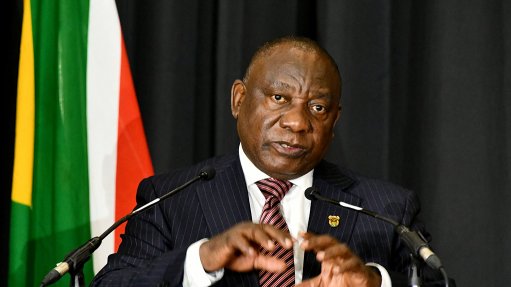
President Cyril Ramaphosa
President Cyril Ramaphosa says that he will, in the coming days, announce a comprehensive set of actions to achieve much faster progress in tackling load-shedding, which has worsened significantly over the past three years and has intensified in recent weeks to the point of being implemented at Stage 6.
Since the start of the year, Eskom has implemented 73 days of load-shedding and the utility is forecasting that rotational power cuts of between Stage 2 and 4 will be required for at least another week as it seeks to recover from a recent illegal strike, precipitated by a wage deadlock that has since been settled.
In his weekly newsletter, the President acknowledged that it was “no time for business as usual”, adding that “we need to act boldly to make load-shedding a thing of the past".
He stressed that, while there were no easy solutions, government was committed to exploring “every avenue" and using "every opportunity to ensure that we generate enough electricity to meet the country’s needs”.
“Over the past two weeks, we have been working with the relevant Ministers and senior officials on a range of additional measures to accelerate all efforts to increase our electricity supply.
"The message is clear: this is no time for business as usual. We need to act boldly to make load-shedding a thing of the past."
He said that the measures that had already been taken by government to address the crisis would "secure the supply of reliable and affordable electricity into the future", but that government was now looking at what additional measures could be taken immediately to "bring that goal closer".
"What the past two weeks have demonstrated is that we need to do more and do so with the utmost urgency," Ramaphosa added, referring to the particularly intense implementation of rotational power cuts by Eskom that coincided with a wildcat strike at a number of its coal stations.
Speaking following the publication of the President's newsletter on Monday morning, Eskom CEO André de Ruyter said that there had been various meetings over the weekend involving The Presidency, as well as other Ministers and officials to discuss ways to address load-shedding, including by introducing more capacity to the grid at an accelerated pace.
De Ruyter reiterated that up to 6 000 MW of capacity was needed to provide Eskom with the time and space it required to implement the maintenance across the neglected and poor performing coal fleet, and thus reduce the risk of load-shedding.
"We are working in a very close and collaborative fashion with all the roleplayers in government to try and accelerate the solutions that we have to bring on more capacity to the grid as soon as we can."
He confirmed that Eskom intended following up its recent release of 18 grid-ready land parcels in Mpumalanga, which is expected to result in the addition of 1 800 MW of new private renewables, with the phased release of a further 30 000 ha in the same province.
This land-release programme would probably be conducted on a quarterly basis.
Ahead of Ramaphosa's newsletter, the National Planning Commission (NPC) had called for the declaration of an ‘energy emergency’ to override any red tape currently preventing the construction of new electricity capacity, as well as to make it possible to build 10 000 MW of new generation and 5 000 MW of new storage capacity over the coming two years.
“The most immediate priority is to ensure that new generation capacity is rapidly and urgently brought on to the grid, together with significant new storage capacity.
“Evidence suggests it is possible to do this within 24 months, if 10 000 MW of new generation capacity is rapidly constructed and commissioned as well as 5 000 MW of storage capacity,” the NPC said in a statement, noting that solar and wind power projects could be built rapidly.
Ending load-shedding, the commission added, needed to become a “unifying national goal for the whole country and all stakeholders”.
To achieve the objective of rapidly adding new generation and storage capacity, the NPC said it would be necessary to remove key obstacles, including:
- removing the 100 MW ceiling on distributed generation projects, as Eskom’s grid code and grid-connection authorisation processes were sufficient to regulate this market;
- scrapping any National Energy Regulator of South Africa registration processes that delay implementation and replacing these with an online registration procedure for database purposes only;
- streamlining environmental and water-use approvals, while taking fuller advantage of the Renewable Energy Development Zone framework that allows for fast-tracking of such approvals; and
- introducing a temporary exemption from local-content requirements for construction and commissioning of new generation and storage capacity due to come online in the next 36 months. In parallel, key stakeholders should reach a formal agreement that strikes a balance between short-term importation of components with the need for phasing in upstream industrialisation over the medium- to long-term.
De Ruyter, meanwhile, refused to be drawn on the nature of the solutions that could be announced by Ramaphosa, but said there was consensus that "we cannot have continued load-shedding to the extent that we've seen over the past week and [are] also forecasting for the current week".